Travel, at its core, is an exploration. It’s a journey beyond geographical boundaries, a venture into the unknown, and an opportunity for personal growth. Yet, the true richness of travel often lies not simply in visiting iconic landmarks or breathtaking landscapes, but in engaging with the diverse cultures that shape those places. A deeper understanding of these cultures transforms a simple vacation into a profound and enriching experience, leaving travelers with memories, perspectives, and a broadened worldview that transcends the typical tourist snapshot.
Cultural immersion enhances travel experiences in multifaceted ways. Firstly, it provides a richer appreciation for the history and traditions of a destination. Visiting a historical site is one thing; understanding the societal context that birthed it, the stories it holds, and the way it continues to resonate with the local population elevates the experience exponentially. Learning about the struggles, triumphs, and evolution of a culture adds depth and meaning, transforming mere sightseeing into a journey through time and human experience. For example, exploring the ancient ruins of Angkor Wat in Cambodia is far more impactful when coupled with an understanding of Khmer history, the rise and fall of empires, and the enduring spiritual significance of the site for the Cambodian people.
Secondly, engaging with local customs and traditions fosters deeper connections with the people of a destination. Beyond the superficial interactions of a typical tourist, genuine engagement with local life fosters mutual respect and understanding. Learning a few basic phrases in the local language, for instance, opens doors to more authentic interactions. Participating in local festivals, attending traditional ceremonies, or simply sharing a meal with a local family provides an intimate glimpse into their daily lives, beliefs, and values. These experiences challenge preconceived notions and stereotypes, fostering empathy and breaking down cultural barriers. The warmth of a shared meal, the laughter during a local celebration, and the simple act of exchanging stories become cherished memories, far more meaningful than any souvenir.
Furthermore, the exploration of diverse cultures broadens individual perspectives and challenges ethnocentrism. Stepping outside of one’s own cultural comfort zone exposes individuals to alternative ways of life, different belief systems, and varying social norms. This exposure helps to cultivate a more nuanced understanding of the world and its complexities. Witnessing how other societies structure their governments, their economies, and their social interactions can challenge pre-existing assumptions and promote a greater appreciation for cultural pluralism. For example, observing the intricate social fabric of a traditional community in the Andes Mountains or the bustling marketplaces of Marrakech can profoundly alter one’s understanding of societal organization and individual roles within a community.
Beyond the individual level, the benefits extend to broader societal implications. Exposure to diverse cultures fosters global citizenship and intercultural competence. Travelers return home with increased awareness of global issues and a greater appreciation for the interconnectedness of the world. This understanding can translate into greater empathy and advocacy for marginalized communities and a more informed participation in global conversations. Increased cultural sensitivity also becomes a valuable asset in professional life, particularly in increasingly globalized industries. Individuals with intercultural competence demonstrate adaptability, open-mindedness, and a capacity for effective cross-cultural communication, skills highly valued in the contemporary workplace.
However, responsible cultural engagement is paramount. The aim is not to observe cultures as mere curiosities but to engage respectfully and ethically. It is crucial to avoid practices that exploit local communities or contribute to the commodification of culture. Supporting locally owned businesses, respecting local traditions, and engaging with communities in a way that benefits them rather than simply extracting value is essential. Choosing eco-conscious and ethically responsible travel options minimizes the negative environmental and social impacts often associated with tourism. Respect for local customs, clothing choices, and religious practices is also vital to demonstrating genuine consideration and avoiding cultural insensitivity.
In conclusion, exploring diverse cultures is not merely an added benefit to travel; it is the very essence of a truly enriching travel experience. It is about far more than sightseeing; it is about connecting with people, understanding different perspectives, and expanding one’s worldview. By engaging respectfully and responsibly, travelers not only enhance their own journeys but also contribute to the promotion of cross-cultural understanding and appreciation. The memories, perspectives, and personal growth that result from genuine cultural immersion leave an indelible mark, shaping both individual lives and contributing to a more interconnected and empathetic global community. The impact extends beyond the immediate experience, weaving its way into personal values, professional skills, and global citizenship, ensuring that the journey’s enrichment persists long after the traveler returns home.






